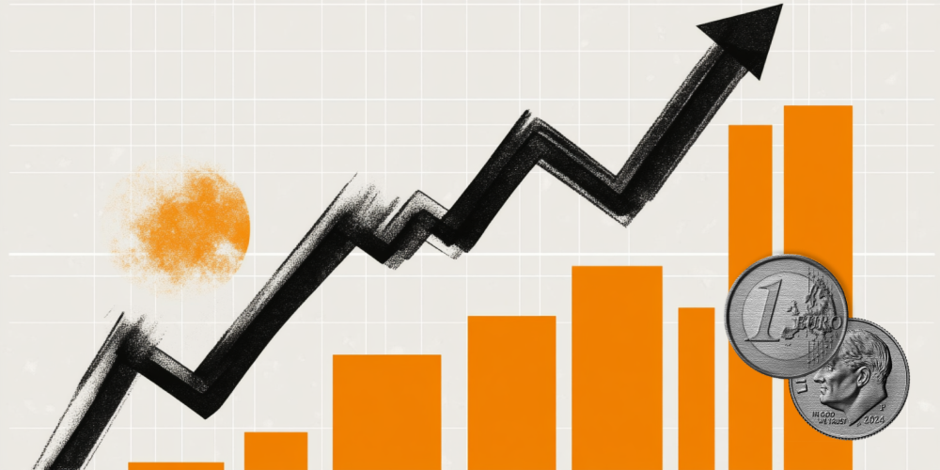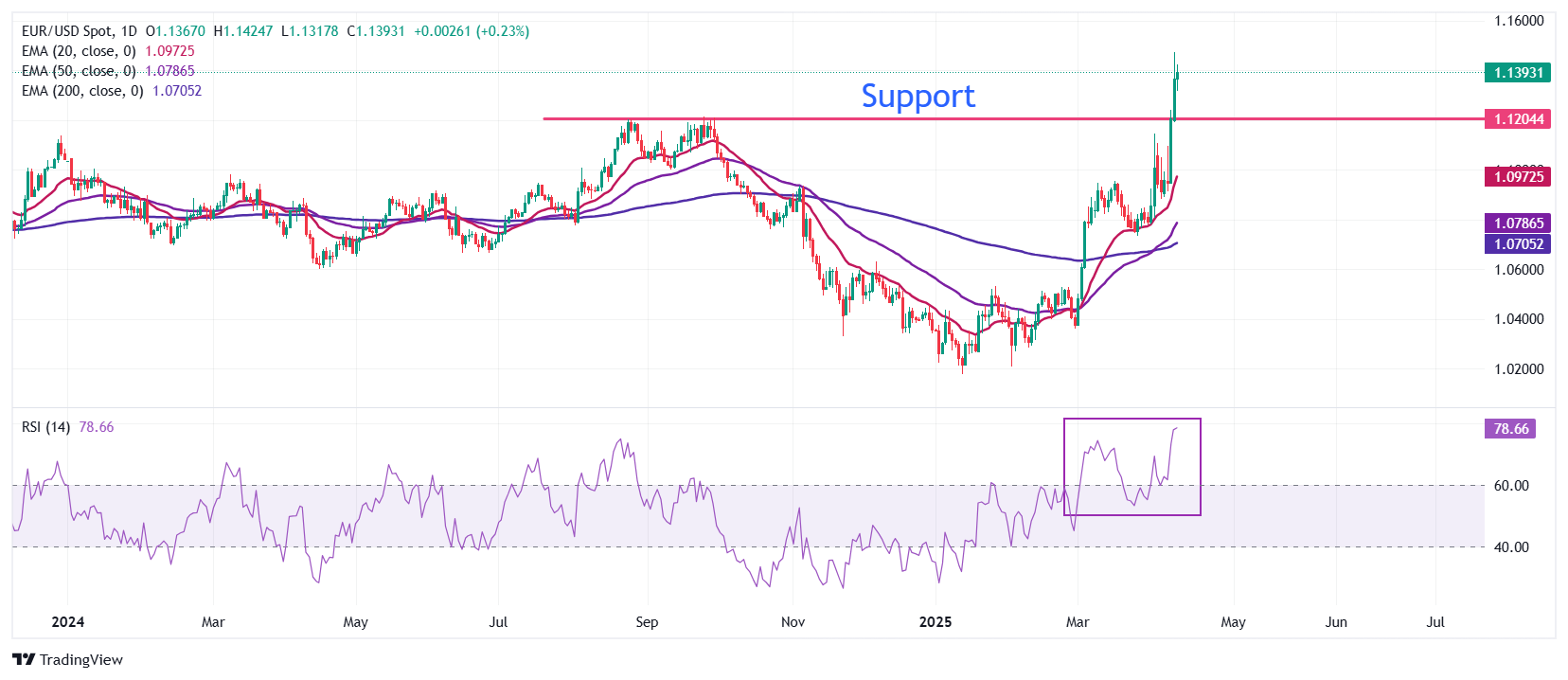Created
: 2025.04.14














![]() 2025.04.14 19:18
2025.04.14 19:18
EUR/USD jumps to near 1.1400 in Monday's European session. The major currency pair aims to reclaim the over-three-year high of 1.1474, which it posted on Friday. The pair demonstrates sheer strength as the US Dollar (USD) continues to dive amid growing fears of United States (US) stagflation, a situation in which inflation increases, the economy deteriorates, and employment cools down.
The US Dollar Index (DXY), which gauges the Greenback's value against six major currencies, sees more downside below the recent lows of 99.00.
Financial market participants are anticipating US stagflation amid deteriorating consumer sentiment and de-anchoring consumer inflation expectations. The University of Michigan (UoM) showed on Friday that the preliminary Consumer Sentiment Index came in significantly lower at 50.8 in April, the lowest level seen since June 2022. US households are worried about the deepening risks of a recession due to the escalating tariff war with China.
On Friday, China raised counter-tariffs on US goods imports to 125%, effective on Saturday. The Asian giant retaliated after US President Donald Trump increased tariffs on Chinese imports to 145%. Market participants expect the scenario of retaliation and countermeasures by both nations to hinder plans of fresh investments by business owners, which eventually would result in moderate economic growth.
Meanwhile, flash 12-month forward UoM Consumer Inflation Expectations accelerated to 6.7% in April from 5% in March. Declining consumer sentiment and soaring consumer inflation expectations are expected to dampen the Federal Reserve's (Fed) efforts to bring price pressures down in the last few years.
On Friday, St. Louis Fed Bank President Alberto Musalem said that if the public begins to expect "inflation will remain high over the long term", the job of restoring "price stability and maximum employment would be much more difficult".

EUR/USD rises to near 1.1400 during European trading hours on Monday. The major currency pair trades firmly as all short-to-long Exponential Moving Averages (EMAs) slope higher, suggesting a strong uptrend.
The 14-day Relative Strength Index (RSI) jumps to near 80.00, indicating a strong bullish momentum.
Looking up, the psychological resistance of 1.1500 will be the major resistance for the pair. Conversely, the 1.1200 region, which limited the EUR/USD advance in August and September, will be the key support for the Euro bulls.
The Euro is the currency for the 19 European Union countries that belong to the Eurozone. It is the second most heavily traded currency in the world behind the US Dollar. In 2022, it accounted for 31% of all foreign exchange transactions, with an average daily turnover of over $2.2 trillion a day. EUR/USD is the most heavily traded currency pair in the world, accounting for an estimated 30% off all transactions, followed by EUR/JPY (4%), EUR/GBP (3%) and EUR/AUD (2%).
The European Central Bank (ECB) in Frankfurt, Germany, is the reserve bank for the Eurozone. The ECB sets interest rates and manages monetary policy. The ECB's primary mandate is to maintain price stability, which means either controlling inflation or stimulating growth. Its primary tool is the raising or lowering of interest rates. Relatively high interest rates - or the expectation of higher rates - will usually benefit the Euro and vice versa. The ECB Governing Council makes monetary policy decisions at meetings held eight times a year. Decisions are made by heads of the Eurozone national banks and six permanent members, including the President of the ECB, Christine Lagarde.
Eurozone inflation data, measured by the Harmonized Index of Consumer Prices (HICP), is an important econometric for the Euro. If inflation rises more than expected, especially if above the ECB's 2% target, it obliges the ECB to raise interest rates to bring it back under control. Relatively high interest rates compared to its counterparts will usually benefit the Euro, as it makes the region more attractive as a place for global investors to park their money.
Data releases gauge the health of the economy and can impact on the Euro. Indicators such as GDP, Manufacturing and Services PMIs, employment, and consumer sentiment surveys can all influence the direction of the single currency. A strong economy is good for the Euro. Not only does it attract more foreign investment but it may encourage the ECB to put up interest rates, which will directly strengthen the Euro. Otherwise, if economic data is weak, the Euro is likely to fall. Economic data for the four largest economies in the euro area (Germany, France, Italy and Spain) are especially significant, as they account for 75% of the Eurozone's economy.
Another significant data release for the Euro is the Trade Balance. This indicator measures the difference between what a country earns from its exports and what it spends on imports over a given period. If a country produces highly sought after exports then its currency will gain in value purely from the extra demand created from foreign buyers seeking to purchase these goods. Therefore, a positive net Trade Balance strengthens a currency and vice versa for a negative balance.
,
![]()
Created
: 2025.04.14
![]()
Last updated
: 2025.04.14

FXStreet is a forex information website, delivering market analysis and news articles 24/7.
It features a number of articles contributed by well-known analysts, in addition to the ones by its editorial team.
Founded in 2000 by Francesc Riverola, a Spanish economist, it has grown to become a world-renowned information website.
We hope you find this article useful. Any comments or suggestions will be greatly appreciated.
We are also looking for writers with extensive experience in forex and crypto to join us.
please contact us at [email protected].
Disclaimer:
All information and content provided on this website is provided for informational purposes only and is not intended to solicit any investment. Although all efforts are made in order to ensure that the information is correct, no guarantee is provided for the accuracy of any content on this website. Any decision made shall be the responsibility of the investor and Myforex does not take any responsibility whatsoever regarding the use of any information provided herein.
The content provided on this website belongs to Myforex and, where stated, the relevant licensors. All rights are reserved by Myforex and the relevant licensors, and no content of this website, whether in full or in part, shall be copied or displayed elsewhere without the explicit written permission of the relevant copyright holder. If you wish to use any part of the content provided on this website, please ensure that you contact Myforex.
Myforex uses cookies to improve the convenience and functionality of this website. This website may include cookies not only by us but also by third parties (advertisers, log analysts, etc.) for the purpose of tracking the activities of users. Cookie policy